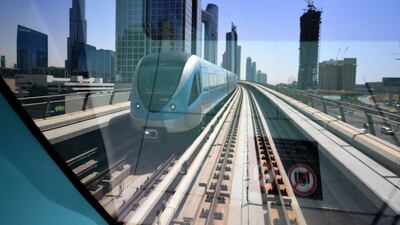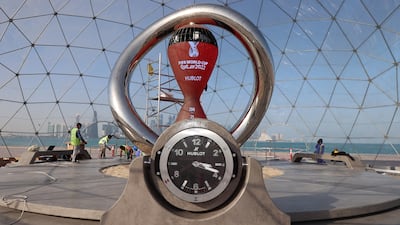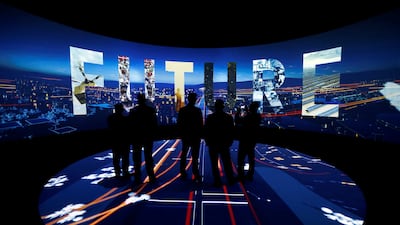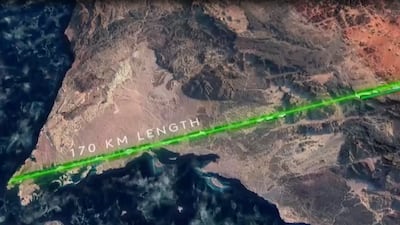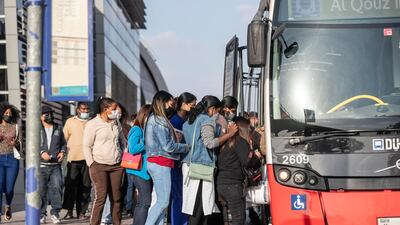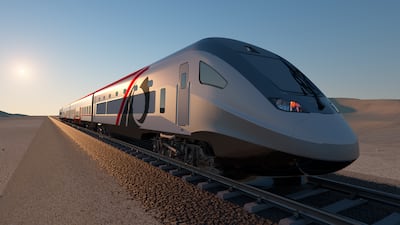The car-heavy Middle East is about to welcome in a public transport revolution as governments pledge billions in post-pandemic funding, according to a leading expert.
Khalid Alhogail, president of the International Association of Public Transport (UITP) told The National there is a hunger for a first-rate public transport service across Mena nations.
Population surges in cities, heavy traffic congestion, and public demand for more sustainable travel options are chief among the reasons for the heavy investment into the sector.
president of the International Association of Public Transport
Another key factor behind the emerging interest in public transport is the private car sector losing its lustre with the price of fuel continuing to increase.
“There is about $100 billion being invested in public transport projects in the Mena region right now,” said Mr Alhogail, who was at the UITP regional congress, taking place in Dubai’s World Trade Centre on Monday.
The pandemic saw huge numbers of people working from home.
While many have already made the move back to the office, with many more expected to follow, Mr Alhogail believes people will no longer accept being stuck in heavy traffic for long periods during rush hour.
That, coupled with the expected population surge in the region’s cities, makes it the perfect time for countries across the region to invest in public transport networks, he said.
“People are realising they can save time if they take rapid public transportation options rather than get stuck in traffic,” said Mr Alhogail, who is also general manager of Saudi Arabia Public Transport Company.
“That’s what is going to convince them to move from private to public transportation.
“Until now, the Mena area was not recognised for its public transportation options but that is going to change.”
Driving your own private car was no longer perceived to be the attractive option it might have once been, Mr Alhogail said.
“The regulation across the region is changing to make it more attractive to take public transport,” he said.
“It’s no longer the case that you get cheap fuel, toll-free roads and don’t have to pay for parking.
“It’s changing. In fact, it’s changing everywhere across the globe not just in this region.”
He cited a number of schemes across the Mena region as being flagship projects for public transport.
Bahrain metro work progresses
The Dubai Metro line was recently expanded to integrate with the Expo 2020 site.
Etihad Rail has also announced it will soon transport passengers across the emirates, eventually linking up with other countries in the region.
The emirate also launched an urban master plan to divide the city into five key areas, making it a global leader in sustainable transport options.
A 76-kilometre metro line became operational in Doha in 2019, timed to welcome visitors to the Qatari capital before the Fifa World Cup later this year.
The first two tramlines in Casablanca, Morocco, began transporting passengers in 2019, with another two lines due to go live later this year.
Bahrain is also pushing ahead with its own metro network, which will see all major population hubs connected across a 110km track.
The country recently announced the signing of a deal that would see 200 of its cities connected by a new bus service running across 76 routes.
A desire to see transportation become more sustainable has also created opportunities for the region to make progress, said another speaker at the UITP congress.
“New cities are being built from scratch in the region and they are being done so with a clear strategy to be energy affordable and eco-friendly,” said Rumaih Al Rumaih, president of the Public Transport Authority in Saudi Arabia.
“Neom City and the Red Sea Project have clear strategies to make sure the technology they adopt is sustainable.”
Both projects are viewed as key components of the Saudi Arabian Vision 2030, which aims to help the country diversify its oil-based economy.
Neom is a $500 billion megaproject that will be home to cities, towns, ports and tourist hotspots.
The Red Sea Project is currently under construction on more than 90 islands on Saudi Arabia’s west coast.
